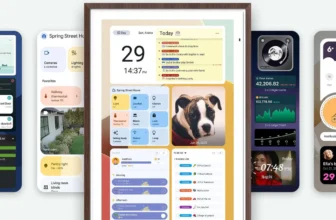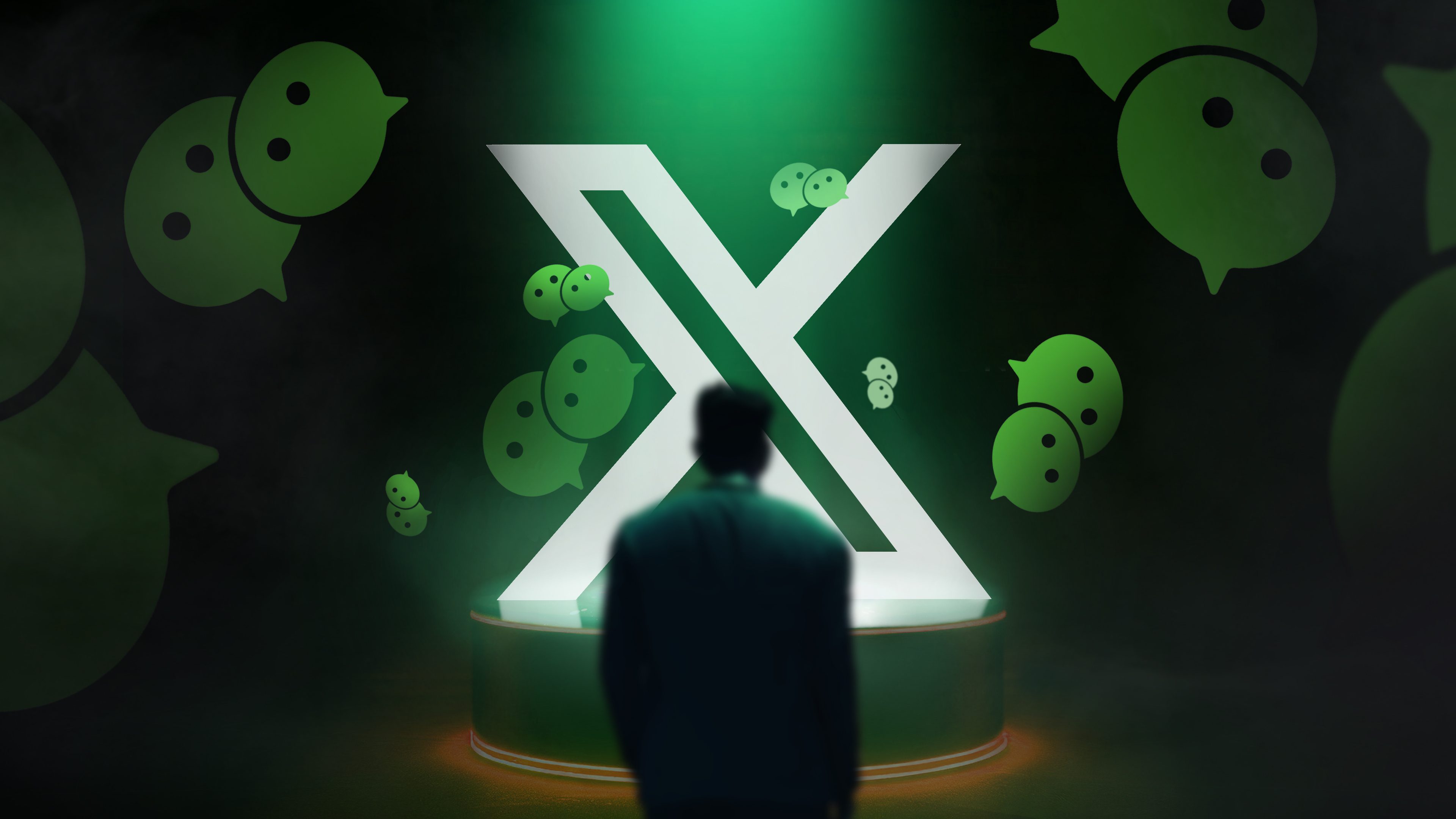
Twitter has become a pure roller coaster ride ever since Elon Musk snatched it up for a measly US$44 billion. Okay, actually it’s only gone downhill since he’s been in charge of the app, which has seen a name change to “X” instead of “Twitter”. That’s not all though, as he is not just interested in changing Twitter’s look, name, and a few new features. Much more than that, he wants to transform the app into a Super App along the lines of WeChat.
I am convinced that this idea is doomed to fail, which is due to both Elon Musk and China. In order to understand what exactly Elon Musk is up to and why it will not work, we will first need to talk about what “WeChat” is in the first place, what the Super App does, and why is this app so controversial.
This is WeChat
WeChat, also known as “Weixin” in China, has become an indispensable part of everyday life in China. About 1.3 billion people use Tencent’s app on a monthly basis, with the lion’s share of them based in China. Let’s talk about the company behind WeChat, what the app does, and why there are reasons to be skeptical about it.
Tencent: The company behind WeChat
Tencent was founded in 1999 and the first product they launched was an instant messenger, which was pitted against ICQ at the time. QQ, the name of the service (previously QICQ), already amassed over 100 million users in 2008. Tencent is one of the largest tech companies in the world and is obviously extremely busy with many initiatives coming from it, just like their western counterparts Google and Meta. They have news portals, social media platforms, and instant messengers, with telecommunications and advertising also being among some of its main focuses.
Tencent is particularly invested in gaming: Riot Games (League of Legends) has been a wholly owned Tencent subsidiary since 2015. Tencent has a 40 percent stake in Epic Games and an 84 percent stake in Supercell (Clash of Clans, Clash Royale). Not only that, Tencent is also on board with many other major names such as Ubisoft and Activision Blizzard. Speaking of investments: Tencent’s money trail can also be found in Snapchat, Spotify, Discord, and even Tesla, among others!
WeChat: How the app became a “Super App”
Tencent already tried to buy WhatsApp more than a decade ago. That move did not work out, so the company unceremoniously rebuilt the app in 2011 and christened it WeChat. Initially, the app, which is also available in Germany for Android and iOS, was a pure WhatsApp clone. Chatting, sending stickers, voice messages, making calls and video calls, and having groups—the shared list of features by the two services is long.
Oftentimes, there were functions that existed on WeChat long before they existed on WhatsApp, such as live location. However, WeChat has long been far more than what Meta’s instant messenger has to offer. However, the app took off because it was significantly upgraded beyond chat functions very early on. Be it business features, games, or services, all of these conceivable tools can be easily integrated into WeChat.
In this way, WeChat became something like a Swiss army knife in China: an all-purpose weapon that ensures China-based users can do almost everything within the app, including chatting, making payments, and playing games.
WeChat: Its most important features
We can also use WeChat in Germany, but we have to live with the fact that the scope of the application is significantly diminished compared to when you are in China. Essentially, WeChat is used in Germany for chatting in the same manner as WhatsApp. However, there are the functions “Moments”, “Shake” and “People Nearby”. We will introduce you to the most important functions, including the ones mentioned.
Messaging
Sure, the Messenger functions are mostly known from WhatsApp and other similar services. You can write to individuals or groups (up to 500 people), send voice messages, share pictures and videos, and everything else that makes up a messenger. What is especially stark in China is how every company has an official WeChat profile. This makes the company extremely accessible to customers should they want to reach out to the company.
Payment: WeChat Pay
Perhaps the most important feature that WeChat has is the payment function. WeChat Pay can be considered a PayPal alternative, but it offers much more options. In China, paying via WeChat Pay or AliPay is so common that many stores no longer allow cash payments. Hence, you don’t just pay online via the app, but can also do so in every Chinese store.
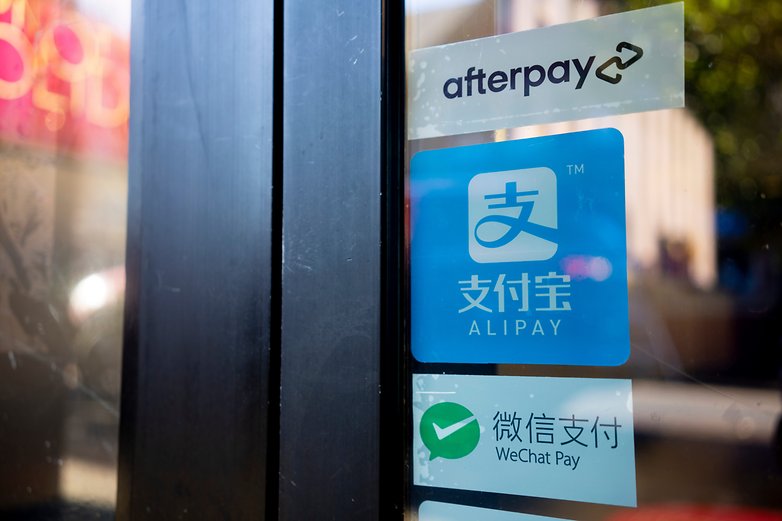
The process is quite straightforward. You scan a QR code and then enter the desired amount to be paid. Whether you’re at the supermarket, buying a train or plane ticket, or paying your rent/electricity/gas, all of those can be settled within seconds via this app. Heck, you can even make real estate purchases via WeChat.
In contrast to the customs rules and regulations in this country, you can really pay via your smartphone everywhere you go. This also applies to street vendors, and even homeless beggars can receive money via WeChat. This means there is no need to throw a dollar into a hat or empty coffee cup, but simply scan the QR code of the person.
Of course, you can also send money to friends easily with WeChat. In addition, you can also store credit cards in the WeChat wallet and pay with them in a snap. Credit cards themselves are rarely accepted in China.
Unfortunately, WeChat Pay is not available in Germany, or only to a limited extent after making some tweaks. In the meantime, however, at least the number of stores that allow those from China who are visiting or residing in Germany to pay via WeChat is increasing.
Social media: Moments
“Moments” is something like WeChat’s Facebook or Instagram replacement. You can share pictures and other content here, including stories accompanied by a soundtrack. The results will appear to your WeChat contacts in a newsfeed fashion. Do you want to keep your loved ones up to date? This is where this part of the app shines.
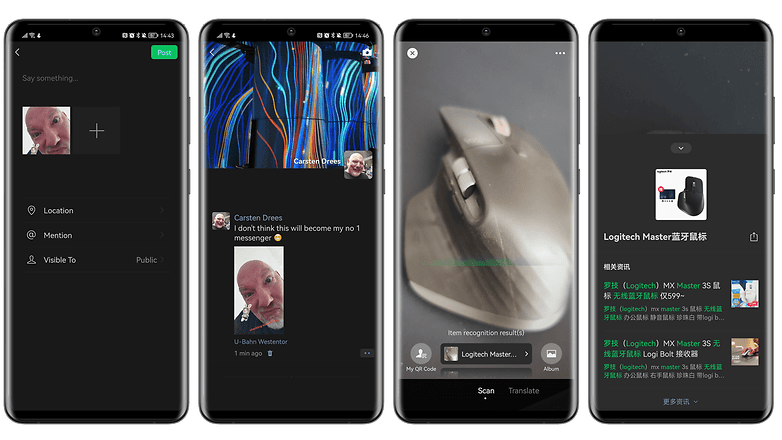
This function is also available outside of China. I just tried it for the first time and cannot tell you if the feature is actually used by many users in Germany.
Dating: Shake / People Nearby
A true Super App, must, of course, also be able to hook people up. Or rather, getting to know someone is made easier thanks to WeChat. The “Shake” function is also available internationally. You use it by simply shaking your smartphone. The app then immediately identifies a person who also just shook their phone, letting you chat directly with them.
Also available in Germany is the “Nearby People” function, which shows you people who are geographically close to you , just like on Snapchat. You can then immediately check out the other person’s profile and start chatting.
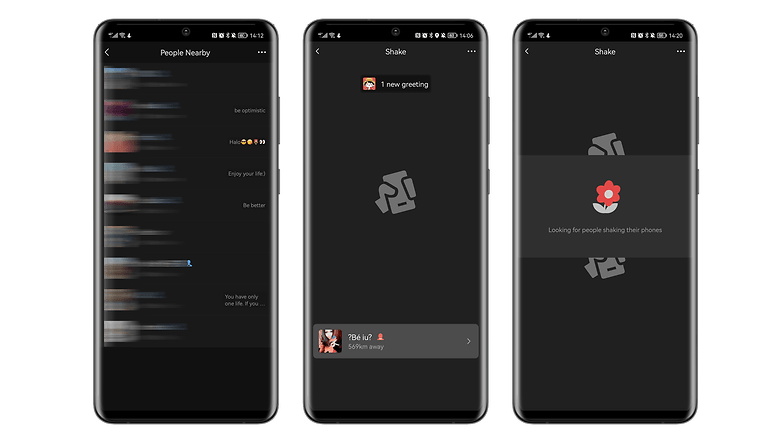
Scan
Similar to Google Lens, WeChat also offers you the option of scanning objects, street signs, buildings, and so on. The QR code plays an important role in the app, whether you want to pay or save a contact. Hence, it is no wonder that a scan function has also been integrated into the app.
However, you don’t just use it to scan when making a payment or getting to know someone. Hold the camera on an object and WeChat recognizes the object, sending you a link where you can buy the object directly. If you were to scan a text, such as a line in a menu, you can have it translated directly.
Mini programs
The mini-programs are not available in Germany, but they are a very important building block for the success of WeChat. Programming them is much less complicated than programming standalone apps. In this way, WeChat also becomes a kind of app store with quite a few different tools.
Installing the mini-programs also works by simply scanning the QR code, and the programs are executed in the cloud. Examples include the Meituan and Didi apps, the two most important apps in China when you want to order something to eat or hail a cab.
This is really only a small overview of the core functions. In China, you can also play games, stream movies, read news, and book nearby restaurants. You can reserve seats at the cinema, on the train, or on the plane, call the handyman, make a doctor’s appointment, rent an apartment, deposit ID documents, and much more. Quite a lot of this is realized via the “mini-programs”.
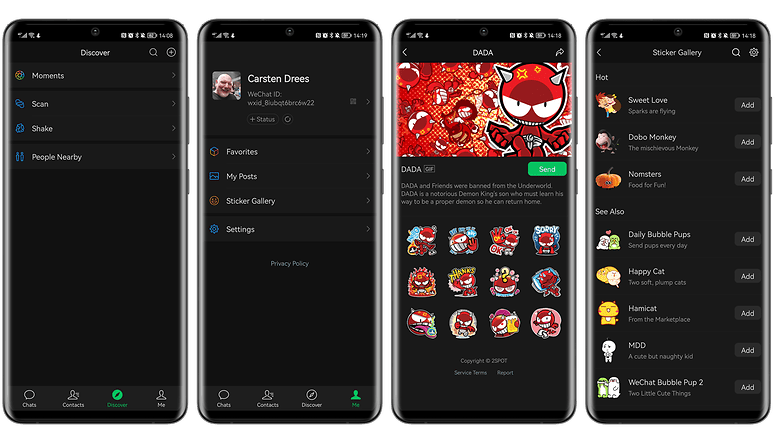
WeChat: Its major drawbacks
Yes, WeChat is what Google or Meta would also like to have: having such a monopoly on everyday life, that makes it almost unnecessary to use any other apps at all. However, you probably already know that this convenience comes at a price, right? The app’s origins alone suggest that it certainly won’t be winning any privacy or security awards.
Speaking of which, you can take a look at the privacy checker platform Exodus for fun. With that platform, you can find out that WeChat asks you for no less than 72 (!) permissions, including many questionable ones. Do you really want a Chinese app to always know where you are, what you pay for, and with whom you communicate?
The sheer size or scope of the app becomes a problem: If everything can be done in a single app, all the data that accumulates every day also ends up with a single company. This becomes even worse with the fear of all this data being passed on to the Chinese government.
That’s no fun in a country that is still fine-tuning a social scoring system. Oh, by the way: While you are in Europe, your phone number is enough to set up an account. Over in China, it is linked directly to your official China ID. Transparent citizenship? Yes, this has long been the case in China.
And yes: The government in China not only reads, but it also decides what can be read. Private and group messages are censored in real-time (!). Criticism of Xi Jinping or anti-regime memes will not even reach the recipient. If you share critical posts in the “Moments” newsfeed, they are deleted within ten minutes. Critics of the ruling regime are also barred from the platform.
To sum it up, you pay for the beautiful and multi-functional app in exchange for your privacy and censorship.
No, Twitter/X will not become a western WeChat.
With all that we know, we come to Elon Musk’s plans: when he’s not busy completely destroying Twitter, he dreams of creating an X app that’s pretty much what WeChat offers in China. The question is, can he even do that?
I don’t think he can succeed. For starters, that has nothing to do with the fact that just by renaming Twitter and burning the brand, he’s crystal clear on what he cannot do.
Reason 1: Competition
WeChat was also able to take off in China because many of the services we use in Europe or the U.S. are banned in China. There is no Google and no Facebook there, and no Twitter either. In such an environment, where their own government hamstrings many of the international players, it is much easier for such a Super App, supported by the same government, to thrive.
Tinder, PayPal, Facebook, Lieferando, WhatsApp, and many more apps and their features, united under one roof? No, I cannot imagine that for the life of me. A payment service, a delivery service, or a messenger might be able to nibble away at the immediate competition. However, I cannot imagine a service like “X” being able to unite all of these. I believe that the antitrust authorities and the governments in the EU and the USA are watching too closely for something like this to emerge.
Reason 2: The West is different from China
Basically, it is easier to put a company in front of the people n China. If Xi Jinping says, “You do it this way now,” then 1.5 billion Chinese will do it that way. In such an environment, a company that is aligned with the government (and willing to provide information) can form a powerful Super App more easily than in the EU. When it comes to data protection alone, Western governments listen more closely and draw red lines that do not exist in China.
Citizens also function differently here. In Germany in particular, we are excessively skeptical and would rather think ten times before trying something new. Paying with a smartphone instead of cash? Nah, I’d rather not! Irrespective of this, however, we are used to a different world than the one we find in the Middle Kingdom. We are a pluralistic people with free elections and decisions, and we are much more diverse than China. People would rather put together their own individual app services than use an all-in-one solution that may not satisfy them in all areas.
Reason 3: Technical requirements
The technical advances of recent decades in the West are not only accompanied by advantages. We see this example in Asia and Africa as well. There, the smartphone caught on much later. Why does that matter? Because back then, most of us went online for the first time on our desktop computers and notebooks. In many less-developed countries, people simply skipped this step. There, people went online directly via the smartphone and are therefore much more receptive to apps that satisfy our needs via the smartphone.
This also applies to payment, by the way: Large swathes of the population didn’t even have a bank account in China a decade or two ago. So people skip bank cards and credit cards, and paid directly via mobile.
Another point that has to do with technology: I also believe that Google and Apple will not let themselves be taken off the hook so easily with an app that has the potential to make Google Play and the Apple App Store obsolete.
Reason 4: Elon Musk!
I saved the most important reason for last. To me, Elon Musk seems to be the biggest obstacle as to why a Super App like WeChat cannot work in the West. Is he a visionary and thought leader? Okay, he may have visions now and then, but he’s succeeding less and less lately with the thinking part.
When a narcissist, egotist, and an uncouth big kid all converge in a single personality and tries to transform a company against all expert opinion, it seems doomed from the start to me. “Twittering,” like “Googling,” has long been a common word in the vernacular. But like the Twitter bird, Elon Musk shot down “tweet” and “retweet” and erased them from history. Instead, it’s now “post” and “repost”. Very original, Elon.
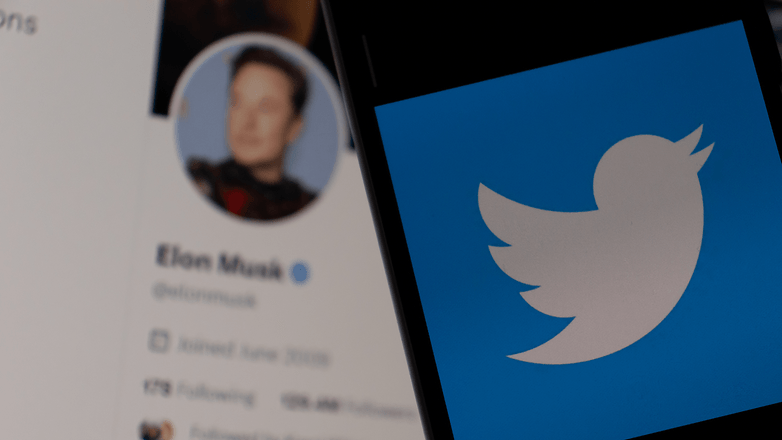
Elon Musk believes that buying Twitter for a measly US$44 billion saved him about “three to five” years in developing the Super App. However, I believe he has since chased away so many good people in the company, advertisers, and users, that he needs those three to five years alone to recover even a portion of that.
Would you want to pay with an app that was launched by this man? (No, please don’t bring up the PayPal example now—he bought into that, not invented PayPal!). Even with his successful companies like Tesla or SpaceX, I believe they are successful not BECAUSE of him, but DUE to him. Whenever he gets his way, things get abstruse. Examples of strange naming conventions like the SpaceX rocket or the Tesla monstrosity called Cybertruck are but a few.
Even if the first three reasons didn’t hold water: Elon Musk’s involvement alone will ensure that Twitter/X does not become a Western Super App like WeChat.
Do you agree with my reasons or do you see it in an entirely different light? As soon as you have recovered from this somewhat long diatribe, I look forward to the discussion with you in the comments.





